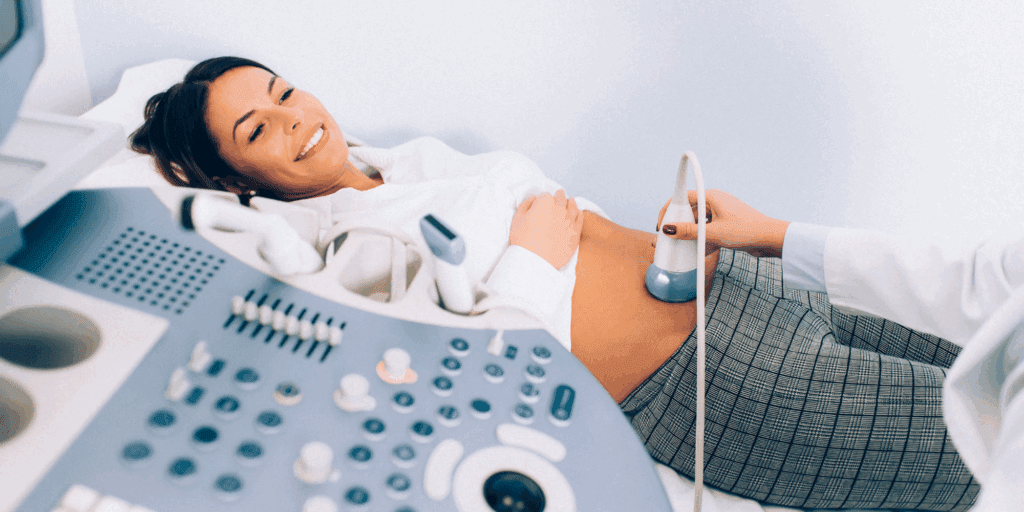Facing an unexpected pregnancy can feel overwhelming, but you don’t have to let fear guide your decisions. Getting accurate information about your options, including the role of an ultrasound before abortion, is key to making an informed and empowered choice.
This article explores Maine’s abortion laws and why an ultrasound before abortion is a critical step in your pregnancy journey. At ABBA, Women’s Choice, we’re here to provide the support and clarity you need during this time.
Is Abortion Legal in Maine?
Currently, abortion is legal in Maine all throughout pregnancy, if a doctor deems it medically necessary.[1]
Although ultrasounds aren’t required prior to abortion in Maine, we strongly recommend it! Keep reading to find out why!
Why Is an Ultrasound Before Abortion Necessary?
An ultrasound before abortion provides essential information to help you make a confident decision about your unplanned pregnancy.
This non-invasive procedure uses sound waves to create images of the fetus and uterus, offering clarity on two critical factors: pregnancy viability and gestational age. By confirming these details, an ultrasound ensures you have the facts needed to explore your options.
What Does Pregnancy Viability Mean?
A viable pregnancy indicates that the pregnancy is progressing normally and has the potential to continue to term.
The first sign of viability is a fetal heartbeat. During an abdominal ultrasound, technicians check for signs like a detectable heartbeat, which typically appears between 6.5 and 7 weeks of gestation.[2]
Transvaginal ultrasounds provide a clearer picture. A transducer is inserted into the vagina and takes pictures of the pelvic cavity. This allows them to rule out nonviable pregnancies, such as miscarriages or ectopic pregnancies (where the embryo implants outside the uterus).
In these cases, abortion is not necessary. Alternative medical care is required, especially for ectopic pregnancies, which can be life-threatening if untreated.
Why Gestational Age Matters
Gestational age refers to how far along you are in your pregnancy, measured from the first day of your last menstrual period.
Knowing your gestational age is crucial because the abortion pill (mifepristone) is only FDA-approved for use up to 10 weeks of gestation.[3]
Benefits of an Ultrasound Before Abortion
Receiving an ultrasound before abortion offers several benefits beyond meeting legal requirements.
It provides peace of mind by confirming the pregnancy’s status, helping you avoid unnecessary procedures or costs if the pregnancy isn’t viable. For example, if an ultrasound reveals a miscarriage, you can pursue appropriate medical care instead of an abortion.
Similarly, identifying an ectopic pregnancy early can be life-saving. Moreover, an ultrasound empowers you with knowledge, allowing you to make decisions aligned with your health and circumstances.
What to Expect During an Ultrasound
An abdominal ultrasound is a safe, non-invasive procedure that uses high-frequency sound waves to create detailed images of your pregnancy.
During the ultrasound, you’ll lie comfortably on an exam table while a trained technician applies a warm gel to your abdomen. They’ll gently glide a handheld device called a transducer over your skin, capturing images of the fetus. You can expect to learn about your pregnancy’s viability and gestational age, helping you make informed decisions.
At ABBA, Women’s Choice, our trained staff ensures a compassionate and supportive experience, answering any questions you may have.
Free Ultrasounds in Portland, Maine
No matter where you are in your unexpected pregnancy journey, you aren’t alone! Our trained ultrasound technicians are here to provide the support and vital information needed to make an informed decision.
We offer free pregnancy tests, free ultrasounds, and a safe, compassionate space to explore your pregnancy options.
Don’t wait to get the care you deserve! Give us a call at (207) 977-2119 or schedule your appointment today.
Please be aware that this article is not meant to be a substitute for medical advice or treatment. Our limited ultrasound examination is strictly for the purposes of confirming your pregnancy, detecting fetal cardiac activity, and estimating gestational age. We cannot diagnose any medical problems you may be experiencing, pregnancy-related or otherwise. Additionally, we do not provide or refer for abortion services.
Sources
- PBS.org. Maine Gov. Mills expands access to abortion later in pregnancy. (2023, July 19). https://www.pbs.org/newshour/politics/maine-gov-mills-expands-access-to-abortion-later-in-pregnancy
- Fetal Development. Cleveland Clinic. (2023, March 3). https://my.clevelandclinic.org/health/articles/7247-fetal-development-stages-of-growth
- Center for Drug Evaluation and Research. (2023, March 23). Mifeprex (Mifepristone). U.S. Food and Drug Administration. https://www.fda.gov/drugs/postmarket-drug-safety-information-patients-and-providers/mifeprex-mifepristone-information

